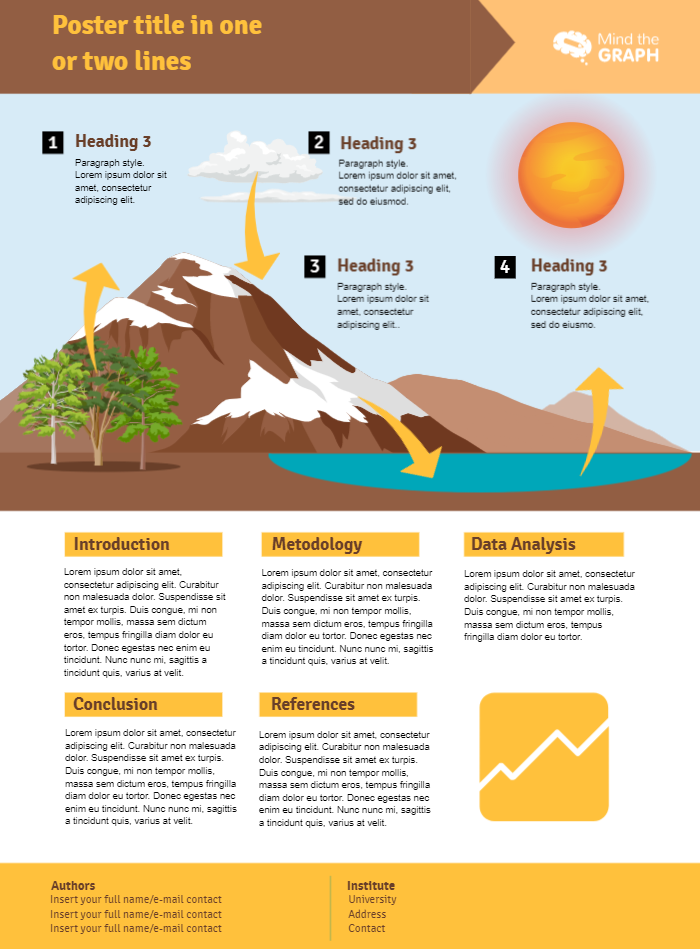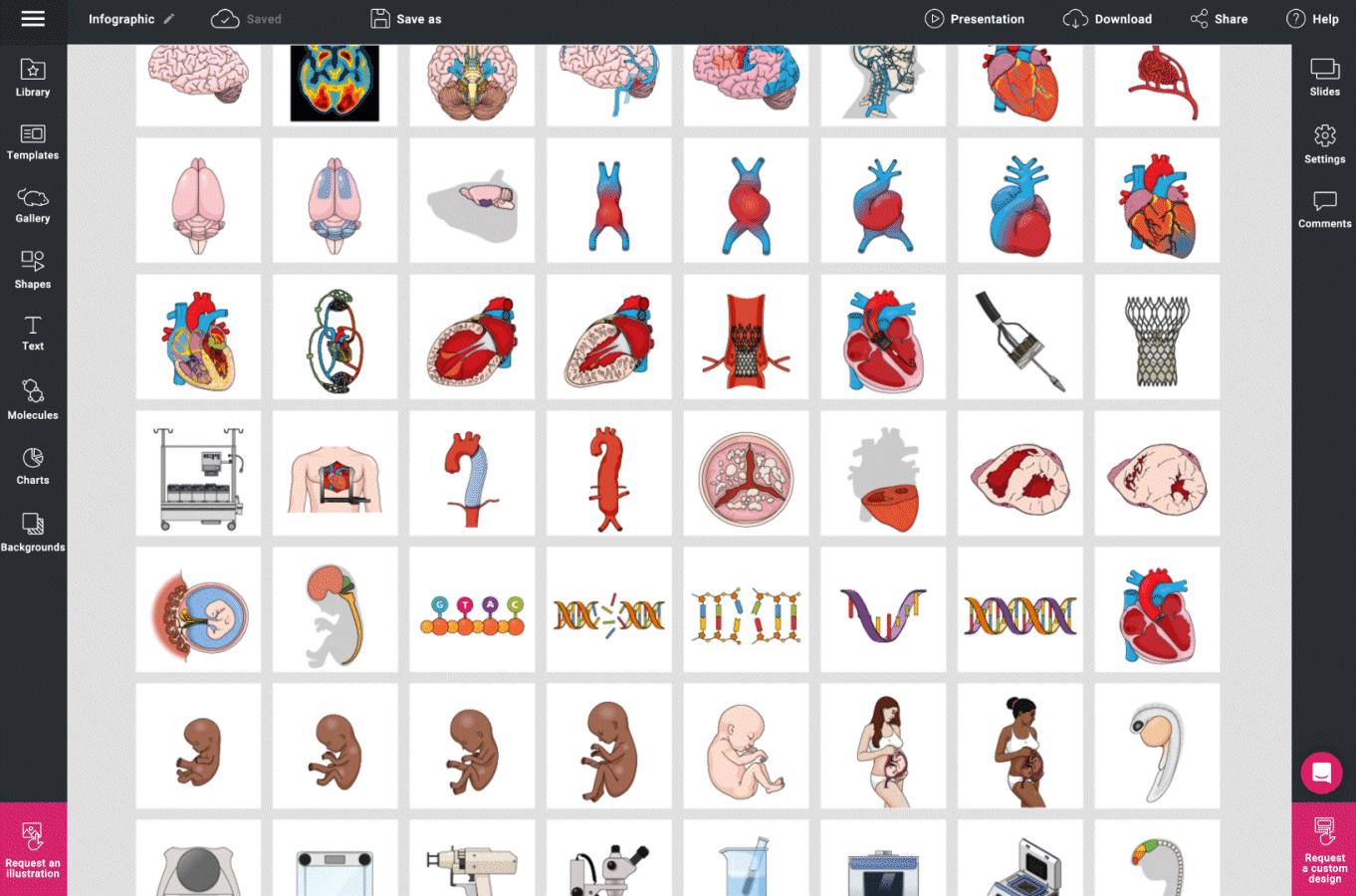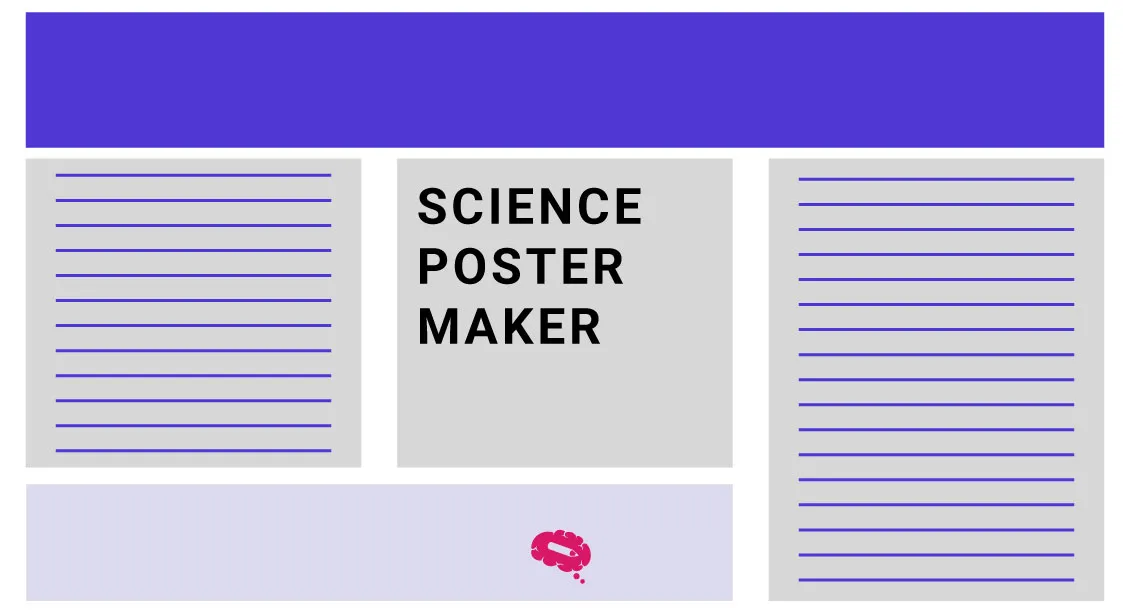Communication is crucial in the world of science, where complex data and intricate concepts are often prevalent. Research papers and presentations offer detailed exploration, but they often fail to engage broader audiences or convey complex information quickly. Science posters are a great tool for visual communication in this situation. An effective science poster can distill complex research into a visually compelling narrative that can be understood and appreciated by experts and laypeople alike. By simplifying and clarifying what can be overwhelming data, visual elements like charts, graphs, and images can turn it into an engaging narrative.
What is a Science Poster Maker?
A Science Poster Maker is an online tool that simplifies the creation of scientific posters. Research findings, experimental data, and scientific concepts are usually presented visually in these posters in academic and research settings. Despite lack of design experience, the tool provides users with a range of features that streamline the poster design process.
A Science Poster Maker offers pre-designed templates, graphical elements, and intuitive tools for creating professional-looking science posters. Science Poster Makers are designed with simplicity and efficiency in mind, unlike traditional graphic design software. There are a variety of templates specifically designed for scientific presentations, including layouts for sections such as abstracts, methodology, results, and conclusions.
By dragging and dropping elements into the template, users can easily insert text, images, charts, and graphs. Color schemes, fonts, and layout configurations can be customized to meet the specific needs of a project. Science Poster Makers also include collaboration features, allowing multiple users to work simultaneously on a poster.

What are the Benefits of Science Posters?
Science Poster Maker provides students, researchers, and educators with a platform for visually appealing and clear presentations of scientific information. A science poster is primarily designed to convey complex scientific data in an engaging, understandable, and persuasive manner. Presentations at conferences, symposiums, or classrooms benefit greatly from well-designed posters.
For students, a Science Poster Maker simplifies the process of translating their research findings into a visual format, allowing them to focus on the content rather than struggling with design aspects. With templates that adhere to common academic standards and presentation norms, researchers can present their work efficiently. These tools allow educators to create instructional materials that are both informative and visually stimulating.
A brief overview of the benefits
There are several key benefits to using a Science Poster Maker, including the following:
- Time-Saving Features: One of the most significant advantages is the time saved in the design process. With ready-made templates and easy-to-use tools, users can create a polished and professional poster in a fraction of the time it would take using traditional design methods.
- Professional-Quality Designs: Science Poster Makers are equipped with high-quality templates and graphical elements that ensure the final product is visually appealing and professional. These tools allow even those with no design background to produce posters that meet the aesthetic and academic standards required for scientific presentations.
- User-Friendly Interfaces: The tools are designed with all skill levels in mind, providing an intuitive and accessible user experience. Using drag-and-drop functionality, customizable templates, and simple editing options makes the process straightforward, enabling users to focus on content instead of design details.
Key Features to Look for in a Science Poster Maker
- An extensive library of templates
A well-rounded science poster maker should offer an extensive library of templates specifically designed for scientific presentations. Instead of having to start from scratch, you can focus on content with these templates.
- Choose tools that offer a wide range of templates tailored to different scientific disciplines, such as biology, chemistry, physics, and environmental science. As a result, you will find a design that matches the subject matter of your project.
- You should be able to customize the templates, adjusting elements such as text, images, and layout to meet your needs. By maintaining a professional appearance, your poster reflects your unique research.
- Easy-to-Use Interface
A science poster maker’s interface can make or break your experience. Both novices and experienced designers can use the user-friendly interface to streamline the creation process.
- Drag-and-Drop Functionality: Text boxes, images, and graphs can easily be added, moved, and arranged using the drag-and-drop system. This feature simplifies the design process, letting you see immediate changes without dealing with complex commands.
- Intuitive Navigation and Toolbars: Make sure the tool has easy-to-navigate menus and toolbars, so you can quickly access the features you need. You will spend less time learning the software if it has an easy-to-use interface that minimizes clutter and maximizes accessibility.
- High-Quality Graphics and Icons
It is vital to include visual elements in science posters so that complex data and concepts can be conveyed in an easy-to-understand manner. Any good science poster maker should have access to high-quality graphics and icons.
- Access to Scientific Illustrations: Your poster tool should provide a rich collection of scientific illustrations, including molecule structures, anatomical diagrams, and laboratory equipment.
- Charts and Diagrams: Integrated options for creating and customizing charts and diagrams are essential. Scientific communication commonly uses bar graphs, pie charts, scatter plots, and other visual data representations.
- Vector-Based Graphics: Ensure the graphics are vector-based, meaning they can be resized without losing quality. Large-format posters require this to maintain clarity.
- Customization Options
To make your science poster stand out and accurately reflect your research, you need to customize it. For a robust science poster maker, you should be able to customize the design to meet your specific requirements.
- The ability to choose and modify color schemes allows you to align your poster’s aesthetic with your institution’s branding or your own personal preferences. Additionally, this can enhance readability and impact.
- A variety of fonts, as well as the ability to adjust font size, weight, and spacing, are vital for ensuring that your text is both readable and visually appealing.
- Adjusting the layout, including text boxes, images, and other elements, is essential for optimizing the flow of information and creating a balanced design.
- Collaboration Tools
Science projects often involve teamwork, and your poster maker should facilitate collaboration to make group work more efficient.
- Real-Time Collaboration: Look for tools that allow multiple users to work on the same project simultaneously. Real-time collaboration features enable team members to contribute their expertise, make edits, and provide feedback without needing to pass files back and forth.
- Version Control: Some poster makers offer version control, which tracks changes made by different users. When reviewing previous versions or understanding how the design evolved, this feature is useful.
- Export and Sharing Capabilities
Once your poster is complete, you’ll need options for exporting and sharing it in various formats. A good science poster maker should make this process seamless.
- High-Resolution Downloads: Ensure that the tool allows you to download your poster in high-resolution formats like PDF or PNG. You need high resolution if you’re creating a large poster for a conference or presentation.
- Multiple File Formats: Exporting your poster in different formats (such as PDF for printing or PNG for sharing on the web) allows you to use it in different ways.
- Direct Sharing Options: Some tools offer built-in sharing features that allow you to send your poster directly via email or share it on social media platforms. Before finalizing the design, this can be helpful for promoting your research or getting feedback from colleagues.
Your science poster maker will benefit your workflow, improve the quality of your posters, and contribute to more effective scientific communication when you have these key features.
Frequently Asked Questions
Q1: Can I use a Science Poster Maker without any design experience?
Answer: Absolutely! Most Science Poster Makers are specifically designed to be user-friendly and accessible, even for those with little to no design experience. You can easily add and arrange text, images, and other elements with these tools due to their intuitive interfaces and drag-and-drop functionality. Whether you’re a student, researcher, or educator, you can create a polished, professional-looking poster with minimal effort.
Here is our blog that will help you make an award winning science poster!
Q2: Are there free Science Poster Maker options available?
Answer: Yes, there are several free Science Poster Maker tools available that provide basic features to help you create simple yet effective posters. For instance, Mind the Graph is a popular option that offers a free version. You can use this tool to create scientific posters that present complex information clearly and engagingly by including a variety of scientific illustrations and templates. While free versions often come with some limitations—such as fewer templates or lower resolution exports—they are a great starting point for those on a budget or looking to explore the functionality of a Science Poster Maker before committing to a paid version.
Q3: How can I print my poster in high quality?
Answer: To ensure your science poster prints in high quality, it’s important to follow a few key steps:
- Export in High-Resolution Formats: When you’re finished designing your poster, make sure to export it in a high-resolution format, such as PDF or PNG. For large-format printing, these formats preserve clarity and detail.
- Choose the Right Dimensions: Ensure that your poster’s dimensions are appropriate for the size you plan to print. The most common poster sizes are A0, A1, and A2, but many Science Poster Makers let you customize the size.
- Use Professional Printing Services: For the best results, consider using a professional printing service. Large posters can be printed by them without losing quality. You can also discuss paper type, finish, and other options with them to enhance the overall look and durability of your poster.
Create An Engaging Visual Representation Of Your Research Paper
Engage your audience with visually appealing visuals crafted from your research, saving you time and capturing their attention. Whether it’s intricate data sets or complex concepts, Mind the Graph empowers you to create engaging infographics. Our intuitive platform allows you to quickly create stunning visuals that effectively communicate your ideas. Our team of experts is available to provide you with support and guidance if needed. Start creating today and make a lasting impression. Visit our website for more information.


Subscribe to our newsletter
Exclusive high quality content about effective visual
communication in science.


